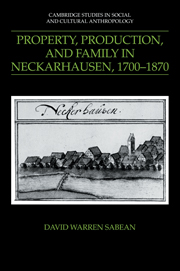Book contents
- Frontmatter
- Contents
- List of tables
- Abbreviations
- Abbreviations of sources
- Weights, measures, and coinage
- On reading kinship diagrams
- Glossary
- Preface
- Dedication
- Introduction
- 1 Productive forces and social differentiation
- 2 Magistrates and records
- 3 The ideology of the house
- 4 Patterns of marital conflict
- 5 The changing context of production
- 6 Marital relations in the context of production
- 7 Marital estate
- 8 State and estate
- 9 Marital fund
- 10 Generational transition
- 11 Reciprocities of labor and property
- 12 Reciprocities in parent–child relations
- 13 Authority, solidarity, and abuse
- 14 Family charges on the transfer of property
- 15 The real estate market
- 16 Kinship and the sale of property
- Conclusion
- Appendix
- Bibliography
- Index
- Cambridge studies in social and cultural anthropology
13 - Authority, solidarity, and abuse
Published online by Cambridge University Press: 09 February 2010
- Frontmatter
- Contents
- List of tables
- Abbreviations
- Abbreviations of sources
- Weights, measures, and coinage
- On reading kinship diagrams
- Glossary
- Preface
- Dedication
- Introduction
- 1 Productive forces and social differentiation
- 2 Magistrates and records
- 3 The ideology of the house
- 4 Patterns of marital conflict
- 5 The changing context of production
- 6 Marital relations in the context of production
- 7 Marital estate
- 8 State and estate
- 9 Marital fund
- 10 Generational transition
- 11 Reciprocities of labor and property
- 12 Reciprocities in parent–child relations
- 13 Authority, solidarity, and abuse
- 14 Family charges on the transfer of property
- 15 The real estate market
- 16 Kinship and the sale of property
- Conclusion
- Appendix
- Bibliography
- Index
- Cambridge studies in social and cultural anthropology
Summary
Because Johannes Bosch reproached young Hans Jerg Hess with his father …, so Johannes Bosch is fined for a grievous misdemeanor.
- GerichtsprotocollOn many practical levels, households of married, adult children were inter-twined with those of their parents. Generally speaking, the younger generation was provided with just enough land to keep them anchored in the village and tied to the interests of their parents and to the needs of their property-owning elders. The wisdom of the practice was embedded in the proverb already cited: “Don't put young bees in a full hive.” Although we can pinpoint two important structural moments in the devolution of property – the marriage of the young couple and the decease or retirement of the older ones – there were all kinds of makeshift arrangements which allowed real estate to be passed on in fits and starts, with tentative agreements and reversals. Even land and buildings passed on to married children as their legal property (Eigenthum) would be thrown back into the estate of their parents to be redistributed among all their heirs. However, frequently, and above all in the nineteenth century, land found in marriage contracts was given to children in usufruct only. In those instances where the parents went bankrupt, such land found its way to the auction block to satisfy the demands of creditors. In any event, the relationship established between parents and children through the devolution of land was complicated during that period by the addition of third-party mortgage interest.
- Type
- Chapter
- Information
- Property, Production, and Family in Neckarhausen, 1700–1870 , pp. 321 - 340Publisher: Cambridge University PressPrint publication year: 1991

